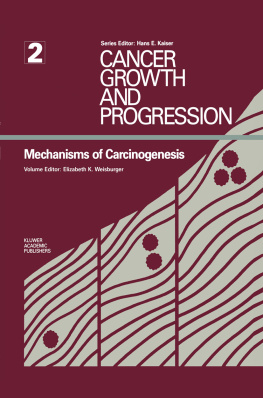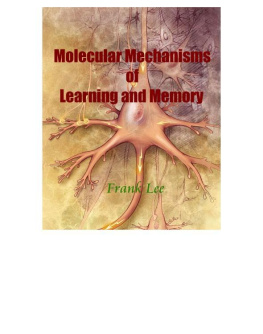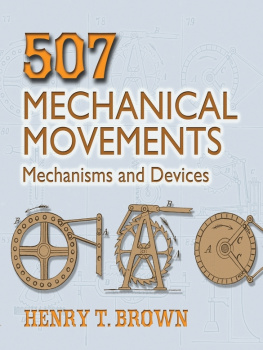Carl F. Craver is associate professor in the Philosophy-Neuroscience-Psychology Program at Washington University in St. Louis. Lindley Darden is professor of philosophy at the University of Maryland.
The University of Chicago Press, Chicago 60637
The University of Chicago Press, Ltd., London
2013 by The University of Chicago
All rights reserved. Published 2013.
Printed in the United States of America
22 21 20 19 18 17 16 15 14 13 1 2 3 4 5
ISBN-13: 978-0-226-03965-7 (cloth)
ISBN-13: 978-0-226-03979-4 (paper)
ISBN-13: 978-0-226-03982-4 (e-book)
Library of Congress Cataloging-in-Publication Data
Craver, Carl F., author.
In search of mechanisms : discoveries across the life sciences / Carl F. Craver and Lindley Darden.
pages cm
Includes bibliographical references and index.
ISBN 978-0-226-03965-7 (cloth : alkaline paper)ISBN 978-0-226-03979-4 (paperback : alkaline paper)ISBN 978-0-226-03982-4 (e-book)
1. Mechanism (Philosophy) 2. BiologyPhilosophyHistory. I. Darden, Lindley, author. II. Title.
QH331.C898 2013
146'.6dc23
2013003717
 This paper meets the requirements of ANSI/NISO Z39.481992 (Permanence of Paper).
This paper meets the requirements of ANSI/NISO Z39.481992 (Permanence of Paper).
IN SEARCH OF MECHANISMS
Discoveries across the Life Sciences
CARL F. CRAVER AND LINDLEY DARDEN
The University of Chicago Press
Chicago and London
Dedicated
to
Anna
and
Lindley Joy,
Amanda,
Amelia, and
Elliott
SUMMARY OF CONTENTS
CONTENTS
ILLUSTRATIONS
FIGURES
TABLES
PREFACE
Science is an engine of discovery. From the farthest reaches of space to the most fundamental units of matter, the crowning aim of science is to open the black box of nature and to show how it works. In this book, we use examples drawn from across the life sciences to illustrate how biologists open black boxes to reveal the hidden mechanisms that produce, underlie, or maintain the phenomena characteristic of living things.
We have three primary objectives. First, we offer a systematic, descriptive account of historical and contemporary episodes illustrating biologists search for mechanisms. We discuss the questions that figure in the search for mechanisms, and we characterize the experimental, observational, and conceptual considerations used to answer them. We also characterize the dimensions of success along which scientists measure, or ought to measure, their progress. Second, we offer an instructive framework to provide advice for learning how to reason about mechanisms. We use examples from the history of biology to highlight questions, constraints, and strategies that scientists use or might use as they construct, evaluate, and revise their descriptions of mechanisms. We characterize the strategies abstractly so that they might be suitable for application in altogether different discovery problems. Third, we offer a vision for the integration of biology. The search for mechanisms serves as one of the central integrative ideals for the biological sciences. Biology is in large part a search for mechanisms, and the search for mechanisms typically requires interfield collaboration. We show how the diverse fields of biology, from evolutionary biology to protein chemistry, from anatomy to ecology, from neuroscience to oncology, integrate their differing perspectives when they contribute jointly to an understanding of a complex mechanism.
We write this book primarily for those who like to discover things for themselves and for those who are teaching people to discover things for themselves. We provide a clear picture of what the search for mechanisms is and of how the search for mechanisms is driven by empirical investigation. We have also compiled a catalogue of resources to consider during a discovery episode. We hope that our colleagues in the history and philosophy of science will see in this work a novel vision of the nature of discovery in biology, a much neglected topic. But our primary goal is to write a practically useful book for those engaged in discovery: one that brings some order and reason to the messy process of searching for mechanisms and that offers some inspiration and caution from the history of science.
Most fundamentally, then, this book is for the curious. It is for people who enjoy figuring out for themselves how things work. Most people, we are told, have only a very shallow understanding of even rudimentary facts about biology, and even about how the mundane items in their lives (such as televisions and toasters) work. The curious, in contrast, are unsettled when they discover such gaps in their knowledge, and they set out to fill them. Most people, we are told, are utterly unaware of the gaps in their knowledge and confidently report to know quite well certain rudimentary facts about biology (and about televisions and toasters) when they do not know them at all. The curious are unsettled when they discover such lapses in their judgment, and they develop ways of being vigilant against them.
We describe the discovery of mechanisms and a set of general questions, constraints, and strategies exhibited in discovery episodes across the life sciences. We show these questions, constraints, and strategies at work in classic exemplars of research from fields across biology and through the centuries. To the extent that scientific reasoning about mechanisms represents a most exacting and refined exemplar of how properly to learn for ones self how things work, the various historical examples we have chosen function as exemplars of mechanism discovery, specimens that offer clues about how to discover mechanisms. Taken collectively, the examples establish the tremendous reach of the mechanistic worldview in contemporary biology and the centrality of the search for mechanisms to much of what biologists do.
In order to facilitate communication with an audience beyond our disciplinary homes, we wrote this book with a few explicit rules. We must say a bit to justify our decisions.
The first rule is: Stay positive. Our goal is to provide the framework for a productive and useful philosophy of discovery grounded in our previous work on mechanisms and mechanistic explanation. We measure progress in terms of the clarity with which we describe the diverse aspects of mechanism discovery, the diversity and utility of the discovery strategies we emphasize, and the suggestive pull of our approach for those who would work with us to take this admittedly preliminary project further. This is not a book about philosophical disagreements. It is a book about scientific discovery.
The second rule: Minimize disciplinary self-reference. For example, we avoid when possible the proprietary jargon of philosophy and favor plain descriptive terms. Likewise, we avoid the studious contextualization, footnoting, and qualification characteristic of academic writing in order to focus on the reasoning strategies on display in our exemplars of mechanism discovery.
Most importantly, we have removed from our text almost all references to the primary and secondary literature on which we rely. Many of the ideas in this book came directly out of our own studies in the history and philosophy of biology. Some came from our own scientific research experience. Some came from reading such sources as Francis Bacon, Ren Descartes, Robert Boyle, Claude Bernard, Ramon y Cajal, Francis Crick, and Joshua Lederberg. Others came from our contemporary colleagues in history and philosophy who emphasize the importance of mechanisms, most notably: Adele Abrahamsen, Bill Bechtel, Jim Bogen, Stuart Glennan, Peter Machamer, Paul Thagard, Robert Richardson, and Bill Wimsatt. Our goal is to collect many of the insights from these diverse literatures into a synthetic whole.
Next page








 This paper meets the requirements of ANSI/NISO Z39.481992 (Permanence of Paper).
This paper meets the requirements of ANSI/NISO Z39.481992 (Permanence of Paper).